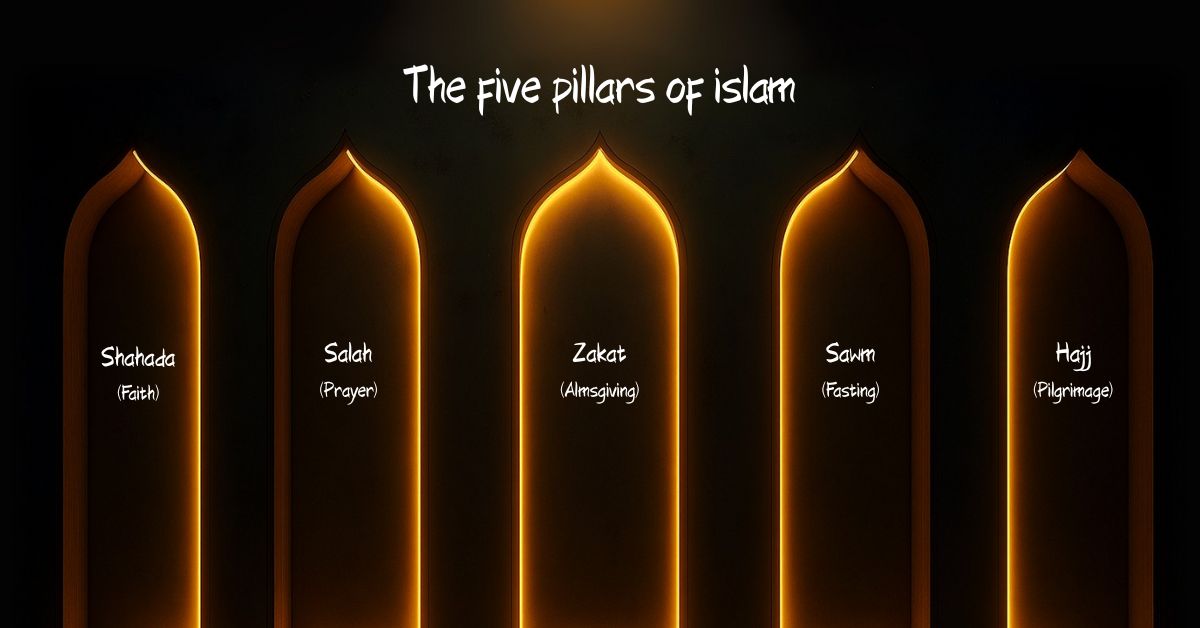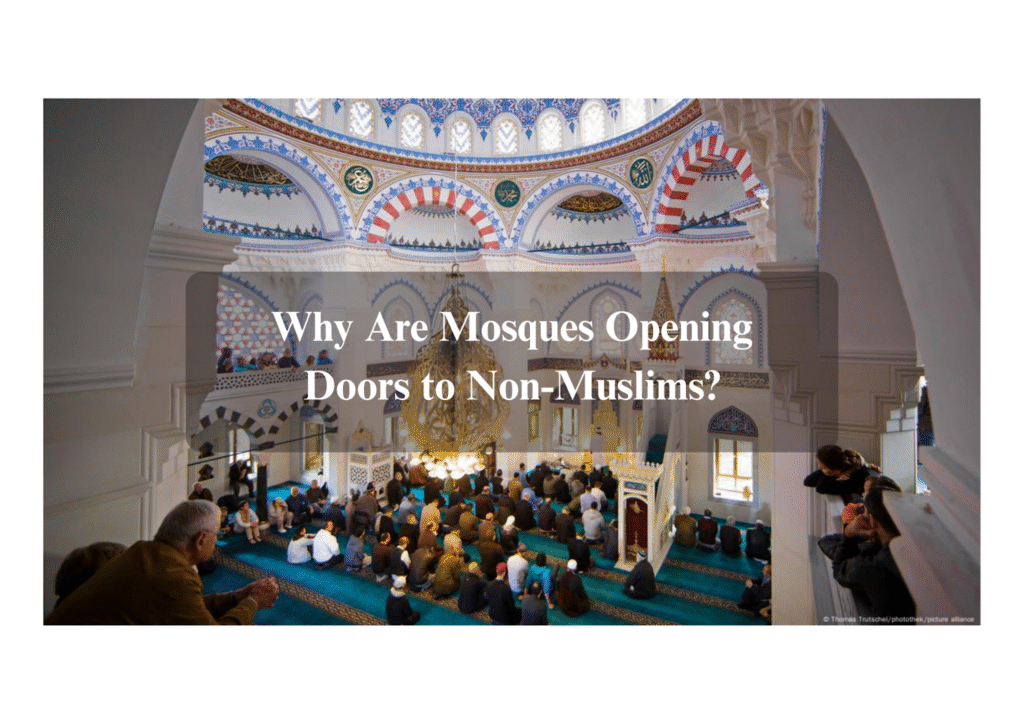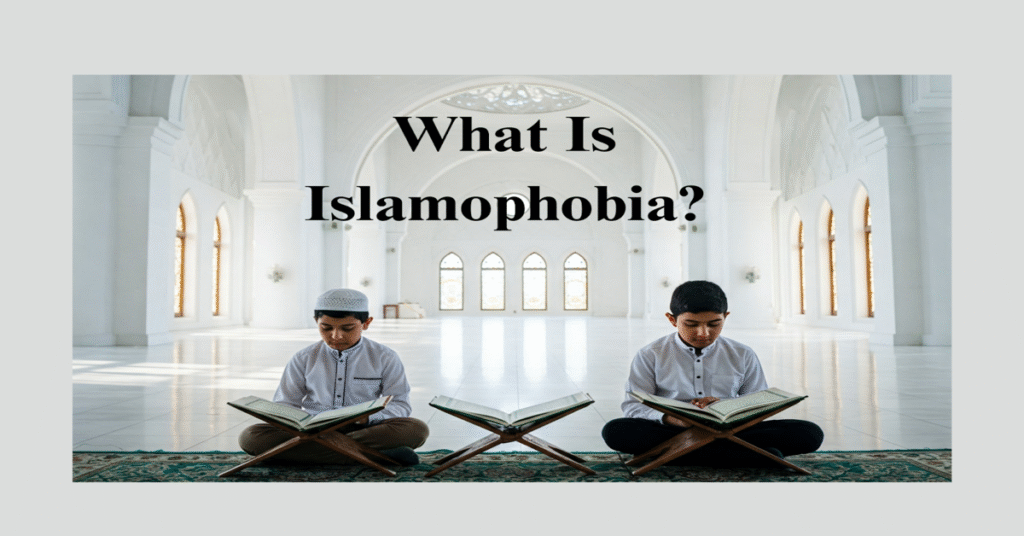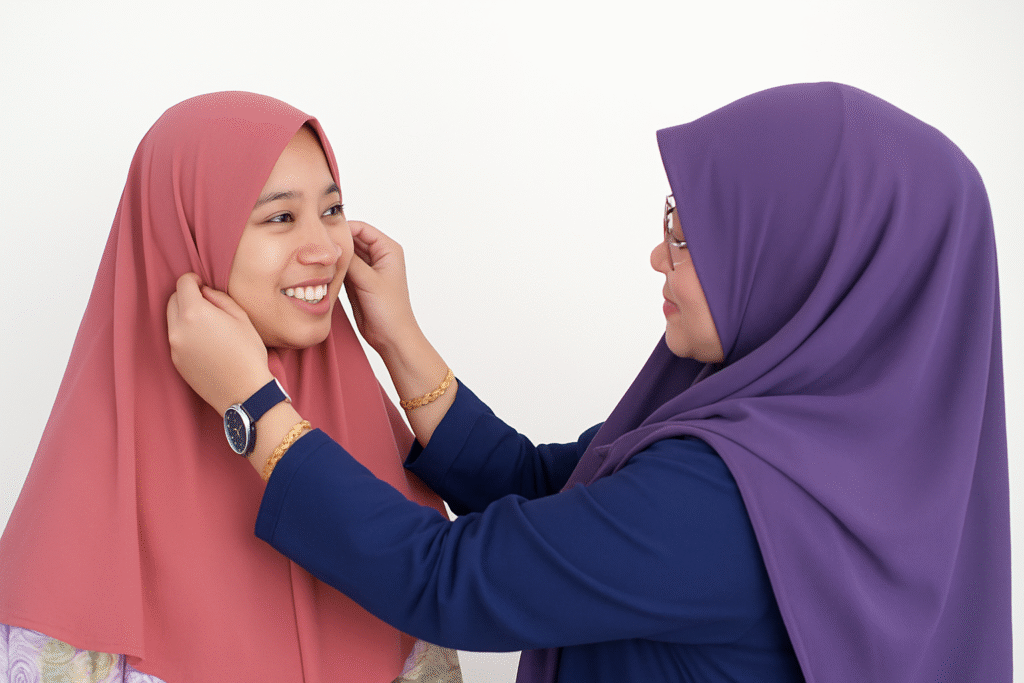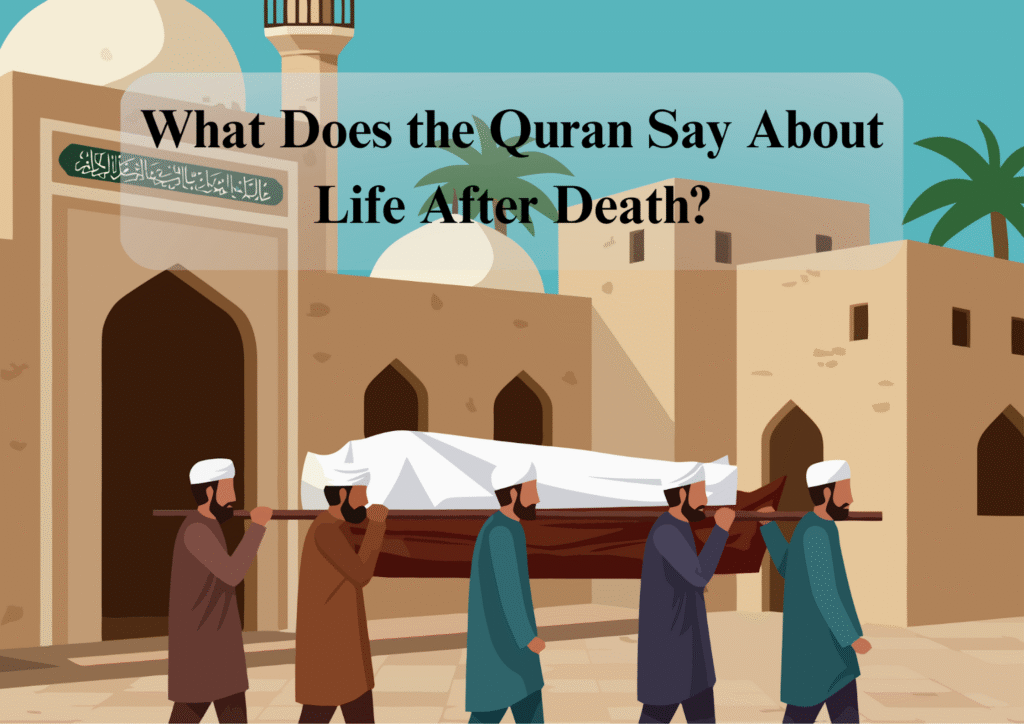Islam is built on a clear foundation of faith and practice. Islam the word itself, is derived from the Arabic term “Salima”, which means peace. Islam is a religion of peace. It doesn’t encourage violence, hatred, polytheism, idolatry, forced acceptance of religion, etc. The Religion has Five Pillars that depict a great value in the lives of Muslims. Just as the foundation of a building is not strong without its pillars, Islam is also void without their five pillars.
The Prophet Muhammad ﷺ said:
“Islam is built on five pillars…” (Sahih Bukhari & Sahih Muslim).
These Five Pillars of Islam are not just rituals; they are the heart of what Muslims believe and the daily framework of worship, charity, and devotion. Understanding them gives insight into the basic beliefs of Islam and the core principles of Islam that unite Muslims worldwide.
1. Shahadah – Declaration of Faith
The first pillar is the Shahadah-meaning to bear witness. “There is no god but Allah, and Muhammad is His Messenger.”Those who bear this witness or the Shahadah and believe in it are called Muslims.

This simple yet profound statement shapes a Muslim’s identity and worldview. It acknowledges Allah’s oneness and the finality of Prophet Muhammad ﷺ. The Qur’an says:
“there is no god ˹worthy of worship˺ except Allah.…” (Quran 47:19).
The Shahadah is whispered into a newborn’s ear and becomes the final testimony of a believer’s life. It is the starting point of faith, defining the essence of what Muslims believe.
“Today I have perfected your faith for you, completed My favour upon you, and chosen Islam as your way…” (Quran 5:3
A Muslim is one who believes in Islam as his religion and follows its teachings, who believes in Allah as his Lord and Creator, who obeys the teachings of the Quran, who follows Muhammad as the final Prophet and Messenger.
2. Salah – Daily Prayer
The second pillar is Salah-prayer that is obligatory, which is performed five times daily. It is mandatory for an adult Muslim to offer five daily prayers without fail. It connects Muslims to Allah throughout the day, from dawn, through noon, afternoon, sunset, and till night.
“Remember Allah—whether you are standing, sitting, or lying down. But when you are secure, establish regular prayers. Indeed, performing prayers is a duty on the believers at the appointed times….” (Quran 4:103). The purpose of our life is to worship Allah and obey His commands. Salah is the best form of worship and obedience to the Almighty.
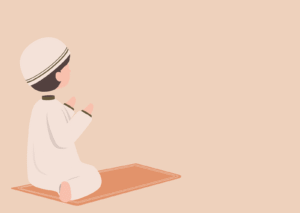
Allah also commands in the Qur’an:
“Indeed, prayer prohibits immorality and wrongdoing…” (Quran 29:45).
Salah keeps believers mindful of Allah, instills discipline, and creates a rhythm of peace in daily life. For Muslims, this is a constant reminder of the core principles of Islam – humility, submission, and devotion. We pray to him directly and He answers our prayers
“Your Lord has proclaimed:Call upon Me, I will respond to you. Surely those who are too proud to worship Me will enter Hell, fully humbled.” (Quran 40:60).
Thinking of Allah makes our heart pure of any wrongdoing, it makes our intentions pure, our lives become examples for others to follow.
3. Zakat – Charity
The third pillar, Zakat, is alms-tax or charity. It means to share the wealth given to us (by Allah) with the poor and the needy.The Zakat is the right of needy Muslims to share in the wealth of those believers whom Allah has blessed with more than their needs.
“And in their wealth there is a recognized right for the needy and the poor.” (Quran 70:24-25)
This highlights Islam’s concern for social justice and care for the less fortunate. The Qur’an emphasizes:
“And establish prayer and give Zakat…” (Quran 2:110).
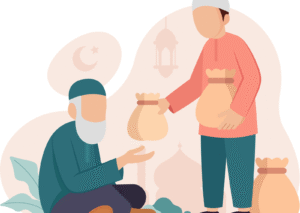
By purifying wealth, Zakat strengthens community ties and reduces inequality. It reflects the basic beliefs of Islam, where generosity and compassion are key.
“Take from their wealth ˹O Prophet˺ charity to purify and bless them, and pray for them—surely your prayer is a source of comfort for them…..” (Quran 9:103)
Just as we need to take showers to clean our bodies and we wash our clothes to remove the dirt, we must give Zakat to make our earnings clean of any impurity.Anyone who is from the family of Our beloved Prophet Muhammad (Ahl al-Bait) cannot receive Zakat. The Nisaab is the minimum amount of wealth that one possesses before he or she is obligated to pay Zakat. The following are the items for which we must pay the Zakath:
- Money. Gold, Silver
- Land and Property
- Savings
- Animals
- Grains,Vegetables, fruit crops
The Nisaab of the value of each item differs. However, Muslims are required to give 2.5% of their savings each year to those in need. It is not necessary to pay Zakat in the month of Ramadan or any certain month. Charity given in Ramadan brings greater Barakah than usual and the reward for the believers in return multiplies during this month.
4. Sawm – Fasting in Ramadan
The fourth pillar is Sawm or fasting in Ramadan. Ramadan is the ninth month in the Islamic Hijri Calendar. Sawm means “to refrain from” or “ not to do something” where Allah asks Muslims to abstain from food, drink, and worldly desires from dawn to sunset for an entire month. It’s obligatory for every adult Muslim.
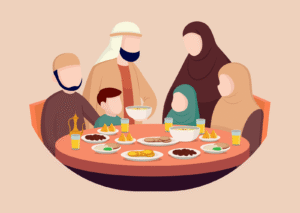
The Qur’an declares:
“O believers! Fasting is prescribed for you—as it was for those before you1—so perhaps you will become mindful ˹of Allah˺.” (Quran 2:183).
The purpose of fasting is to create Taqwa or mindfulness in our hearts and to make us pious or Muttaqin. The Fasting, if observed properly, prepares us to follow the right path of Islam and avoid the wrong path of disbelief. A true Fasting is not only to give up food and drink but also to give up bad habits. When fasting we should not lie, fight, get angry, or use bad language. Fasting teaches us to control ourselves. Prophet Mohammed said:
“Whoever does not give up false statements (i.e. telling lies), and evil deeds, and speaking bad words to others, Allah is not in need of his (fasting) leaving his food and drink.” (Sahih al-Bukhari 6057)
Beyond physical restraint, fasting nurtures patience, gratitude, and empathy for the hungry. It is a powerful form of spiritual training and a reminder of the core principles of our religion Islam – self-control and closeness to Allah.
The Prophet (ﷺ) said, “(Allah said), ‘Every good deed of Adam’s son is for him except fasting; it is for Me. and I shall reward (the fasting person) for it.’ Verily, the smell of the mouth of a fasting person is better to Allah than the smell of musk.” (Sahih al-Bukhari 5927)
The true reward of Fasting is to gain the pleasure of Allah.
5. Hajj – Pilgrimage to Makkah
The fifth pillar is the Hajj pilgrimage to Bait Allah (the House of Allah), a journey every Muslim must undertake at least once in their lifetime if they are physically and financially capable.This pillar- Hajj takes place during the Islamic month of Dhu al-Hijjah.
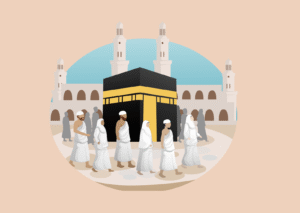
“Surely the first House ˹of worship˺ established for humanity is the one at Makkah—a blessed sanctuary and a guide for ˹all˺ people.” (Quran 3:96)
Bait Allah or the Ka’bah is the first house of worship built to honor Allah alone. “Al-Masjid al-Haram”, the Sacred Mosque, is another name of Bait Allah.
During Hajj, millions of Muslims gather in Makkah, all dressed simply, symbolizing equality before Allah. They are required to make Tawaf around the Ka’bah. There is no difference in nationality, the color of our skin, the amount of wealth we possess,etc during Hajj. The Qur’an mentions:
“Call ˹all˺ people to the pilgrimage. They will come to you on foot and on every lean camel from every distant path” (Quran 22:27).
Hajj unites Muslims from across the globe, reminding them of the universality of the basic beliefs of Islam.
Why the Five Pillars of Islam Matter
The Five Pillars of Islam are more than duties; they are a pathway to spiritual growth and community well-being. They embody what Muslims believe, illustrating the core principles of Islam: faith, worship, charity, self-discipline, and unity.
By practicing these pillars, Muslims align their lives with the will of Allah, seeking balance between worship and everyday responsibility. They nurture the soul, strengthen society, and remind believers of their ultimate purpose – to worship Allah and live righteously.
Do all Muslims practice the Five Pillars of Islam the same way?
Yes, but practices may vary in cultural expression while the fundamentals remain unchanged.
What is the Shahadah meaning in simple terms?
It is the declaration that there is no god but Allah, and Muhammad ﷺ is His Messenger.
Why is fasting in Ramadan significant?
It develops patience, empathy for the poor, and closeness to Allah.
Is Hajj required for every Muslim?
Only those physically and financially capable are required to perform Hajj once in their lifetime.
How often do Muslims perform Salah prayer?
Muslims perform Salah prayer obligatorily five times daily: Fajr (dawn), Dhuhr (noon), Asr (afternoon), Maghrib (sunset), and Isha (night).
What is the difference between Hajj and Umrah?
Hajj is the major pilgrimage performed during specific dates in Dhul-Hijjah and is one of the Five Pillars. Umrah is a lesser pilgrimage that can be performed at any time of the year.
What happens if someone cannot fulfill all Five Pillars?
Islam provides concessions for those who cannot fulfill certain pillars due to physical or financial constraints. For example, those who are ill may postpone fasting, and those without means are not required to perform Hajj.
Who is required to pay Zakat charity?
Every adult Muslim who possesses wealth above a certain threshold (nisab) for a full lunar year is required to pay Zakat, which amounts to 2.5% of their accumulated wealth.

